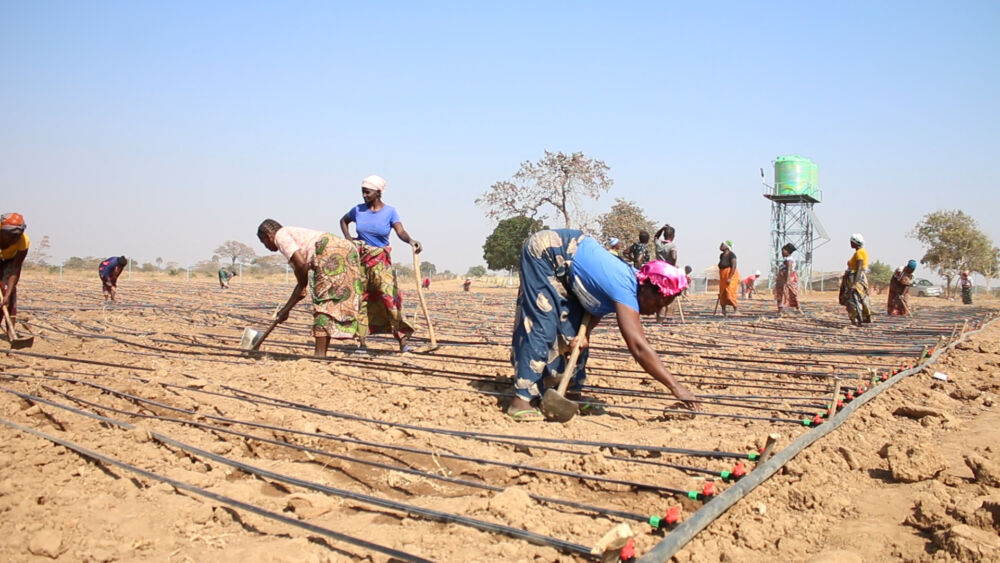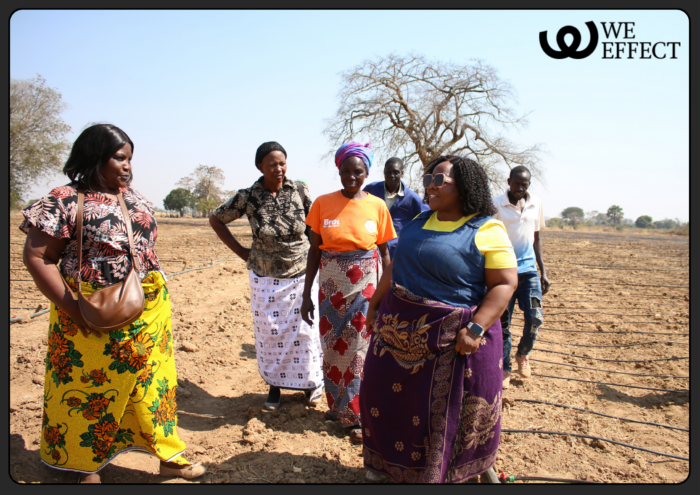We-Effect Intervenes with Lifesaving Irrigation Project.
Date
September 11, 2024
Women from the Kapilipili Area Association landscape their three-hectare garden, featuring a commercial borehole with solar power, drip irrigation system and 20,000-liter water tanks, secured by a wire fence, installed at a cost of K600,000 by We-Effect Zambia in Mumbwa District. Pic:Kruger
A devastating drought in Mumbwa District, Central Province, has led to a significant decline in crop production. According to the Ministry of Agriculture, 56,052 hectares of maize and 30,873 hectares of soybeans have been ravaged by drought. Out of the 62,280 hectares of maize and 50,612 hectares of soybeans planted, insufficient soil moisture resulted in widespread crop failure. This calamity has severely threatened food security in the district, as noted by Mumbwa District Senior Agricultural Officer, Kamwenu Kazamba.
Ms. Kazamba reported that as of February 20, 2024, drought had also affected other crops, including 656 hectares of sunflower, 20 hectares of cowpeas, 296 hectares of groundnuts, and 25 hectares of beans. In total, 88,422 hectares of farmland and 69,412 households, many led by women, have been impacted by the drought.
In response, We-Effect Zambia, with funding from the Swedish Embassy, has launched a pilot irrigation project aimed at providing water resources to the Kapilipili Women Association, part of the Mumbwa District Women Association. This critical intervention is designed to mitigate the drought’s impact and support the resilience of women farmers and the local farming community.
We-Effect, a Swedish NGO with over 40 years of operations in Zambia, has made significant strides in empowering women in Mumbwa District. Working with women’s clubs and cooperatives linked to the Mumbwa District Women Association, the organization focuses on agricultural development to enhance livelihoods, particularly for women living in rural poverty. They provide training in sustainable farming practices, increasing production capacity among women farmers.
Partnering with the Mumbwa District Women Association (MDWA), We-Effect installed an industrial borehole for the Kapilipili Women Association, funded by the Swedish Industrial Development Agency (SIDA) at a cost of K600,000. The We-Effect Project Coordinator, Rudo Chingobe, emphasized that this initiative is part of the Women Economic Empowerment Project, which aims to improve women’s economic resilience following recent droughts.

“Once properly managed, we are confident the women will achieve economic independence and provide good nutrition for their families,” Ms. Chingobe said during a recent inspection of the Kapilipili Area Association Garden Project. She explained that the severe drought of 2023-2024 prompted We-Effect to install boreholes as a resilience measure.
The project serves 10 women’s clubs, benefiting around 300 households, by providing a three-hectare plot for gardening. “The land is fenced, the borehole is drilled, and we have installed a 20,000-liter tank with drip irrigation and a solar panel system,” Ms. Chingobe noted. Additionally, the borehole will provide water for livestock and reduce the burden on women who previously had to walk long distances for clean water.
“We will also link the women farmers with reputable buyers to ensure they receive fair prices for their produce,” she added. Ms. Chingobe revealed that Kapilipili is just one of six planned sites across Zambia, with future projects in Chadiza, Lundazi, Choma, Kalomo, and other areas. Kapilipili will also serve as a training hub, where women farmers can learn new agricultural techniques to replicate in their communities.
Mumbwa District Women Association (MDWA) Coordinator, Claire Sianjelele, praised the initiative and noted that while the women of the Kapilipili Association are dedicated, the drought severely impacted their farming activities. “This new irrigation system will significantly improve their economic status,” she said.
The Kapilipili Association, consisting of 10 women’s clubs with 300 members, now boasts an industrial borehole, drip irrigation pipes, a 20,000-liter water tank, and a protective fence. Ms. Sianjelele shared plans to plant vegetables and green maize on the three-hectare plot, adding, “The goal is to elevate the economic levels of the women in this area.”
“We-Effect and the Swedish Embassy’s support is a significant milestone for us. We look forward to seeing similar facilities in other areas every three years,” Ms. Sianjelele stated.
Tryness Mpandika, the Chairlady of the Kapilipili Area Association, expressed her joy at the developments in their garden. “This irrigation system is a dream come true. For years, we relied on distant wells for water. Now, we can irrigate our crops more efficiently,” she said.
Ruth Ntitima, another member, shared that many club members had abandoned the association due to the labor-intensive task of fetching water. “Now, with this modern system, our workload is greatly reduced,” she said.
Project Engineer Humphrey Mwenya from AZMA Technology Company Limited confirmed that the project was completed according to specifications. “We have installed a commercial borehole, solar system, submersible pump, 20,000-liter water tank, drip irrigation for three hectares, and a security fence. This water will support agriculture, livestock, and the community,” he said, encouraging the women to fully utilize the equipment for maximum benefit.
This project marks a pivotal moment for the women of Kapilipili, who now have the resources to improve their livelihoods and contribute to their community’s prosperity.